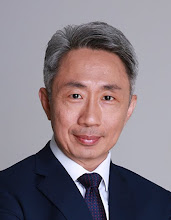An unprecedented and bitter feud among the family of Singapore's prime minister over the legacy of their father has been in the headlines in recent weeks.
Everyone we meet is fighting a battle we know nothing about. Never underestimate the pain of a person because everyone is struggling. Some people are just better at hiding it than others. Sometimes the most outwardly happy people is the most damaged.
Every one of us is always in a crisis, coming out of a crisis or headed for a crisis. That's just part of being on this planet.
Silos - otherwise also known as department politics, divisional rivalry or turf war, is one of the most frustrating aspects of life in an organization. My experience suggests that over time, the feelings of frustrations turns into disappointment, which eventually becomes resentment - even hostility - toward their supposed team mates. This maddening problem exists, to different degrees, in most companies I've worked in. But the fact is, most employees have a genuine interest in working well across divisions.
The older we get, the more we get to see people - including ourselves - acting selfishly, and we have to learn to protect ourselves. Some people seem more naturally disposed to looking for goodness than others. I have to admit that I am not one of them. In our overly judgmental culture, I have been too quick to point out the negative in situations and people. Seeking the good isn't always easy, especially when things don't go how we would like them to or when people hurt us deeply.
Empathy sounds like such a simple word, yet it's actually a complicated feat to be able to understand someone else's perspective and see how different the world looks. Of all the people in my life, I hold those who taught me compassion in highest regard.
As a leader today, I understand that empathy and compassion has a bottom-line impact because it is a strong component of trust.
Many are the times when I have seethed in anger at a word or action of an unthinking or uncaring person. I have wasted valuable hours imagining confrontation. By learning how to forgive, I am no longer consumed by unproductive thoughts. I give up my bitterness. I forgive even those who do not ask for forgiveness.
Every saint had a past and every sinner has a future. Forgiveness, it turns out, is a gift that means more to the giver than it does to the receiver.
Everyone we meet is fighting a battle we know nothing about. Never underestimate the pain of a person because everyone is struggling. Some people are just better at hiding it than others. Sometimes the most outwardly happy people is the most damaged.
Every one of us is always in a crisis, coming out of a crisis or headed for a crisis. That's just part of being on this planet.
Silos - otherwise also known as department politics, divisional rivalry or turf war, is one of the most frustrating aspects of life in an organization. My experience suggests that over time, the feelings of frustrations turns into disappointment, which eventually becomes resentment - even hostility - toward their supposed team mates. This maddening problem exists, to different degrees, in most companies I've worked in. But the fact is, most employees have a genuine interest in working well across divisions.
The older we get, the more we get to see people - including ourselves - acting selfishly, and we have to learn to protect ourselves. Some people seem more naturally disposed to looking for goodness than others. I have to admit that I am not one of them. In our overly judgmental culture, I have been too quick to point out the negative in situations and people. Seeking the good isn't always easy, especially when things don't go how we would like them to or when people hurt us deeply.
Empathy sounds like such a simple word, yet it's actually a complicated feat to be able to understand someone else's perspective and see how different the world looks. Of all the people in my life, I hold those who taught me compassion in highest regard.
As a leader today, I understand that empathy and compassion has a bottom-line impact because it is a strong component of trust.
Many are the times when I have seethed in anger at a word or action of an unthinking or uncaring person. I have wasted valuable hours imagining confrontation. By learning how to forgive, I am no longer consumed by unproductive thoughts. I give up my bitterness. I forgive even those who do not ask for forgiveness.
Every saint had a past and every sinner has a future. Forgiveness, it turns out, is a gift that means more to the giver than it does to the receiver.






No comments:
Post a Comment